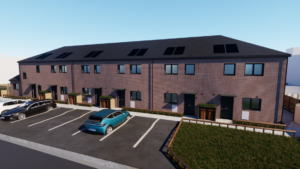NewStart Feature: why rural communities are being hit hardest by leasehold properties

Whaley Bridge
With property developers inserting clauses into leasehold contracts and demanding three and even four-figure annual ground rent sums, leasehold properties have evolved into a headache-inducing financial burden for both owners and buyers.
What’s condemned as a ‘money-grabbing scheme’ isn’t confined to apartments in London, city centre urbanisations or green belt new-build developments, it’s a problem plaguing rural communities and often exposing the less affluent to economic burdens.
The High Peak, a rural borough of north-west Derbyshire, is architecturally-defined by predominantly stone-built, terraced properties and is now witnessing the financial pitfalls of leasehold properties.
In a leasehold contract, the homeowner owns the property but the land the house is built on is effectively owned by the freeholder, or landowner. The homeowner has to pay a yearly ground rent to the freeholder.
The annual ground rents homeowners pay to freeholders for old properties in the Peak District can be a barely noticeable couple of pounds, posing little financial concern to the property owner.
However, more pressing issues arise if a homeowner is late paying their annual ground rent and are faced with an unsuspected bill, which can be around £40 for non-payment. Another issue is the high fees freeholders can charge to property owners for purchasing the lease, despite only earning a couple of pounds a year from the ground rent.
Other problems created by leaseholds in this rural community include homeowners requiring permission to make renovations to their leasehold home, and the difficulty vendors have when trying to sell a leasehold property, as buyers are becoming increasingly wary of purchasing a home with ground rent implications.
Complications
Chris Smalling is the owner of a leasehold terrace property in the High Peak, which is currently on the market. Chris believes his property’s leasehold status is negatively impacting the sale of the property.
‘A couple viewing the property recently seemed really interested but their faces dropped when I told them it was a leasehold. It’s ridiculous really for something that costs me just a couple of pounds each year to have a negative effect on selling the house,’ he said.
‘I have thought about purchasing the freehold to avoid the complications when selling but the company I send payments to is nigh impossible to get hold of, with a phone number that nobody answers and with no website or email address,’ he added.
When quizzed about the process of buying the freehold on a terrace property in the High Peak, one surveying company responsible for collecting ground rents of leasehold properties described the matter as complex and that the legal fees are likely to be in excess of £1,000.
To merely initiate enquiries into the possibility of purchasing the freehold on the terrace house, the surveyors advised they would require an initial, non-refundable administration fee of £360,00, including VAT. The company was quick to point out that the client would be responsible for their own legal fees, together with those of the freeholder.
Naturally, being such a complex process with high costs, many homeowners are reluctant to proceed with the purchasing of a freehold and continue paying the annual leasehold fee.
‘It’s not worth the hassle nor the cost. I’ll just keep writing the annual cheques, as long as they stay so low,’ Craig Horsfield from Whaley Bridge said.
Increase transparency
It’s not just older properties in this rural Derbyshire community that are being sold with encumbering leaseholds, either. New homes in the High Peak, particularly in the small, rural town of Chapel-en-le-Frith, the capital of the Peak District, have increasingly been sold as a leasehold.
Unlike the ground rent on older properties, leasehold fees on these newer properties tend to rise each year, presenting a greater financial commitment for homeowners.
As the High Peak’s MP, Ruth George, who has been actively fighting against economically-crippling leasehold activity in her constituency, said in an interview with the Glossop Chronicle: ‘Many new homes in this area are only being sold on the basis of a long lease of 99 years or more,
‘Homeowners then have to pay ground rent every year which rises far higher than inflation,’ she added.
‘They also have to seek permission and pay high fees for all sorts of things which most of us would take for granted we could do in our own home.
‘Just getting a valuation of their freehold can cost £50,’
In July this year, Mrs George opened a debate on the subject in the House of Commons, asking why the former secretary of state’s promise that the government would make concrete proposals for banning the sale of new leasehold homes are they are still be sold in the High Peak constituency.
Ruth George told the House that many buyers are ‘unable to sell their homes and they’re also unable to afford to buy their freehold by the extortionate rate demanded by the freeholders.
‘How and when will the Government fix this?’
Nigel Adams, Parliamentary under-secretary for Housing, Communities and Local Government, responded by saying the government is introducing legislation to ‘stop the development of new build leasehold houses.’
‘We will also restrict ground rent to a peppercorn and the other thing we are planning to do is fix the loophole in the law to increase transparency,’ Adams added.
As homeowners and buyers patiently wait for such reform to be implemented, the ambiguous and complex leasehold system continues to enrich itself at the expense of ordinary homeowner’s security and wealth and none more so in less affluent, rural communities like the High Peak.















